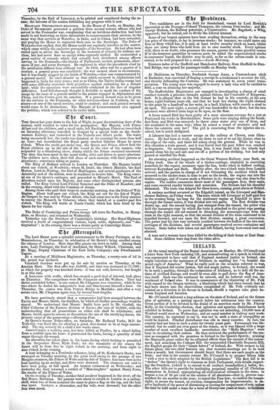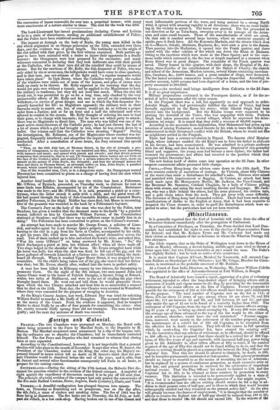IRELAND.
At the usual meeting of the Repeal Association on Monday, Mr. O'Connell read a letter from New York enclosing 121., and animadverting on a speech in which he was represented to have said that if England rendered justice to Ireland, she might calculate on the assistance of Irishmen in enabling her "to humble the Feud eagle of America." What he really said on the occasion referred to was, that if England did render justice, full and ample justice, to Ireland, she would be in such a position, through the cooperation ot Irishmen' as to defy all the na- tions of civilized Europe, and would be even able to pull down the flag of Ame- rica itself. Such was the sentiment he uttered, and he believed such was the sentiment of Ireland also. It was in consequence of the blustering of Mr. Polk with regard to the Oregon territory, a blustering which had since ceased, that he had been drawn into the observations complained of. Mr. Polk evidently cal- culated on a diversion in his favour in Ireland, should a rupture take place be- tween England and America.
Mr. O'Connell delivered a long address on the state of Ireland, and on the future plan of agitation, as a parting speech before his retirement into the country. Great portion of it he devoted to the denial of an assertion made by Mr. Fitzroy Kelly, at the Cambridge election that agitation and agrarian disturbances have subsided in Ireland. To prove that agitation was not subsiding, 150,000 men of Wexford would meet on Wednesday; and an equal number in Galway next week. The country, he regretted to say it, was not in such a state of tranquillity as could be desired. Pneclial disturbance was rife in many counties. In fact., the country had not been in such a state for twenty years past. Fermanagh was dis- turbed; but he could not even guess at the reason, as it was blessed with a large number of most excellent landlords: nevertheless the "Molly Maguinss " were busy in circulating their notices. He then reviewed the performances of the ses- sion as compared with the promises to Ireland in the Queen's Speech; praising the Maynooth grant rather for its collateral effects than the amount of the endow- ment, and attacking the Colleges Bill, the unamended Charitable Bequests Bill, the English people for their "innate hatred" of Ireland, &e. With respect to his future plans, the two chief features are, that monster-meetings are to be held twice a month, lest Government should forget that there are such people as the Irish; and that in his country retreat Mr. O'Connell is to prepare fifteen bills "with a view to their adoption by the British Legislature." The first bill is to declare" the Queen's right to summon an Irish Parliament, with details respect- ing the franchise, (which is to extend to all resident householders,) ballot, &c. The other bills are to provide for instituting perpetual equality of all Christian persuasions in Ireland, appropriating all ecclesiastical revenues to the state; to impose a tax of 20 per cent on the estates of all absentees—that is, persons non- resident for six months in the year; to repeal the Poor-law; to confirm the tenant- right; to secure the tenant, on eviction, compensation for improvements; to de- prive landlords of the power of distrnining or ejecting for nonpayment of rent, unless the land be held under a lease for a term of twenty-one years at least; to *Rasta
the conversion of leases renewable for ever into a perpetual tenure; with many more enactments of a nature similar to these. The rent for the week was 3201.
The Lead-Lieutenant has issued proclamations declaring Cavan and Leitrim to be in a state of disturbance needing an additional establishment of Police; and the Police have been reinforced accordingly.
. The inquest at Arm.agh on the body of Boyle, the young man killed in the riot which originated in an Orange procession on the 12th, extended over three days,. and the evidence was of great length. The testimony as to the origin of the riot tallied with that given by the first witness examined. Both parties ap- pear to have been animated with a desire to injure their opponents in a deadly manner: the Orangemen were best prepared for the encounter; and many witnesses concurred in declaring that they took deliberate aim with their pistols at the Catholics, who in their turn did all the mischief they could by means of atones. But for the exertions of Mr. Kelly, the Sub-Inspector of Police, who was only aided by six or seven men, the belligerents would have come to close quarters; and in that case, one eye-witness of the fight said, "a regular massacre would have taken place." In Ogle Street, where the Catholics were posted, the sashes of the windows were taken out of some of the houses, and piles of stones were built up ready to be thrown. Mr. Kelly expected in the morning that the day would not pass over without a tumult, and he applied to the Magistrates to have the military in readiness; but they did not heed him much. When the riot did break out, it was permitted to go on for a long time, only checked by the very praiseworthy efforts of Mr. Kelly and his men to prevail on the combatants to withdraw —a service of great danger, and one in which the Sub-Inspector fre- quently hazarded his life: no Magistrate appeased; the military were in their barracks ready to march out, but, of course, would not do so without a proper order from a Justice; and so for an hour and a half the infuriated mob were allowed to combat in the streets. Mr. Kelly thought of ordering his men to load their guns, or to charge with bayonets; but he knew not which party to attack: there was no Magistrate to direct him. The man who was killed was one of the most active stone-throwers of the Catholic party; he had just thrown the last of a lot of stones which a girl had brought to him, when he was struck down by a ballet. One witness said that the Catholics were shouting "Repeal!" Dairg the investigation, Mr. Robinson, one of the Magistrates whose conduct was im- pugned, frequently interfered; and altogether the inquiry was not very decorously conducted. After a consultation of some hours, the Jury returned this special verdict- " That, on the 12th July last, at Thomas Street, In the city of Armagh, a pro- cession of Orangemen, to the number of one hundred and fifty, having been marching with banners and music, and armed with pistols and swords ; and that divers persons composing that procession, that is to say, [31 Orangemen, whose names are set forth on the face of the verdict,] aided and assisted by a person unknown to the Jury, made an assault on the person of John Boyle, the deceased ; and that the aforesaid person did then and there, in Thomas Street, as aforesaid, inflict on him, John Boyle, a gunshot Wound, which caused his death, and of which he died."
One of the wounded men, Corr, is in a dangerous state. An Orangeman named Hueston has been committed to prison on a charge of having fired the shot which injured him.
Another fatal konffict: but in this case the victim has been a Policeman. Mr. O'Brien, of Ryninch, proceeded., on Thursday week, to distrain for rent on
some lands near lrallaloe accompanied by six of the Constabulary. Resistance was made to the levy; and Mr. O'Brien, it is said, presented a pistol at a conn- tiyman;when the latter struck it aside with a stick, and the pistol went off: the ball passed through the body of Sub-Constable Riddler, and wounded Moore, another Policeman, in the thigh. Riddler has since died; but Moore is recovering. One of the peasants was wounded in the back by a Policeman's bayonet.
- The Coroner's Jury on the body of the man who was shot by the Police, near Stradone., has given a verdict that the deceased came to his death "b1 a gunshot
wound, inflicted on him by Constable William Farmer, of the Constabulary stationed at &redone; and that there was no sufficient cause to justify him in so doing." The Policeman has been committed to prison on the Coroner's warrant.
. An attempt has been made to murder Mr. George Evans, a solicitor of Lime- rick, and under-agent for Lord George Quin's property at Cratloe. He was re- turning? the city in a gig from his farm at Cratloe, accompanied by his child, a girl six years old; when three men, unknown, spread themselves across the road. Two of them rushed up to him and seized the horse's reins, and asked him, " Was his name O'Brien? on being answered by Mr. ,Evans, "No," the third discharged a pistol at him, but without effect: when all three made off, Two slugs lodged in the shoulder of the horse. Mr. Evans struggled hard while his horse was held; but when the shot was fired, he fell out of the gig, and the horse galloped off towards Limerick at a furious rate; the child holding the dash- • board all through. When it reached Upper Henry Street, it was stopped by two constables. On the child's being taken out of the gig, she stated that her tither was shot; but Mr. Evans, shortly after, walked into the town in perfect safety.
A man has been killed in Kilkenny county by two thieves, for threatening to prosecute them. On the night of the 9th instant, two men named John and James Cleary went to the house of Patrick Dumphy, a farmer, living at Rahard, within two miles of Mullinavat, and were in the act of stealing his pigs when Dumphy heard them. He went out and told them he would prosecute them; upon which the two Clearys attacked and beat him in so unmerciful a manner that he died on the 15th. Next day, the two Clearys were arrested in Waterford; where they were concealed for the purpose of escaping to America.
At the King's County Assizes, last week, Edward Day was tried for soliciting William Butler to murder a Mr. Daffy of Banagher. The accused threw himself on the mercy of the Court. From the evidence it appeared, that he tempted Butler to shoot Daffy by an offer of four pounds for committing the crime: what the enmity towards Duffy sprung from did not transpire. The man was found guilty; and the next day sentence of death was recorded.



























 Previous page
Previous page